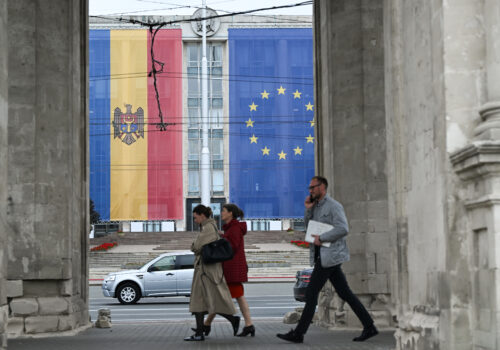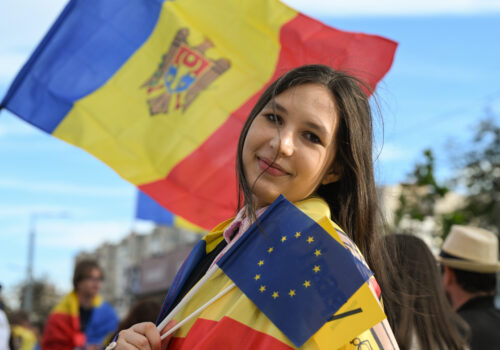Moldova’s ongoing legal disputes with investors could jeopardize its EU hopes
Europe’s poorest country, Moldova, has spent most of its thirty-four years since independence struggling to free itself from Russian dominance, whether in the form of political meddling, energy insecurity, or Kremlin-backed breakaway movements. Most recently, Moldovan President Maia Sandu’s party narrowly won parliamentary elections on September 28 with just 50.17 percent of the vote, a victory heralded as an important outcome for Moldova’s dream of joining the European Union. Other obstacles loom large, however, especially a long and growing list of lawsuits brought by aggrieved foreign investors who claim their efforts to do business in the country have been stymied by corruption and tepid adherence to the rule of law.
On October 6, an arbitration panel was selected in US-based Park Avenue Capital LLC’s arbitration against Moldova, to be adjudicated by the World Bank’s International Centre for Settlement of Investment Disputes (ICSID), which hears disputes between foreign investors and sovereign states arising under international investment treaties. The case is about Moldova’s nonrenewal of a contract between state-owned MoldData and Park Avenue Capital LLC, via its healthcare business MaxMD. At stake, in addition to a large claim of damages, is use of the “.md” web domain, which is widely used in Moldova. The company first tried to start arbitration pursuant to the contract’s terms, but Moldova blocked it, so it has turned to treaty-based arbitration; Moldova is a party to the ICSID Convention.
There’s more. This summer, Moldova lost a case valued at €997 million ($1.16 billion) in the European Court of Human Rights (ECHR) brought by Slovenian-owned agribusiness company Seksimp Group SRL. Here, the foreign investor learned that it had been successfully sued in Moldovan courts without ever being informed of the case, and that its entire holdings in Moldova had been sold at auction without its knowledge. Both the Court of Appeal and the Supreme Court of Justice of Moldova rejected Seksimp Group SRL’s appeals. In a May 15 judgement, the ECHR disagreed and ruled unanimously that Moldova violated the Convention for the Protection of Human Rights and Fundamental Freedoms.
Meanwhile, a decision is pending in an arbitration suit by Liechtenstein-based RTI Rotalin Gaz Trading AG against Moldova, also at the ICSID. The company alleges de facto partial expropriation of its natural gas distribution business, which was the only competitor to Russia’s state-owned Gazprom in the Moldovan market. The government has so far refused to pay its half of the arbitration costs as prescribed in the Energy Charter Treaty (ECT), to which Moldova is a party. At the same time, the government has continued to pursue collection of the fine in local courts despite the ICSID issuing an injunction blocking its enforcement. Moldova also revoked the company’s gas supply license and slapped a $2.9 million fine, the largest in the country’s history, on the company for making profits in early 2023—after Russia’s invasion of Ukraine drove gas prices up in Europe—that the government deemed excessive. Although the arbitration is actually about natural gas distribution tariffs and return of investments made almost twenty years ago, the government contends that Rotalin broke Moldovan law by overcharging customers and then refusing to supply gas below cost during the country’s state of emergency following Russia’s invasion of Ukraine.
The years prior to 2025 are similarly checkered. For an inexhaustive sampling: In 2023, ICSID awarded $2.1 million in damages or reinstatement of the investor’s duty-free business for Moldova’s violation of a bilateral trade treaty with France. Moldova refused to pay, triggering new suits in the United States seeking enforcement of the award, which is now up to $50 million. In 2013, a tribunal ruled for the investor in a $46 million suit brought under the ECT by a power company after a state-owned entity defaulted on a contract, which continues to be fought in parallel proceedings in the US District Court in Washington, DC and the French Court of Cassation. In 2007, the ECHR found Moldova had violated the Convention for the Protection of Human Rights and Fundamental Freedoms in a case brought by US and Bahamian company Bimer SA for the illegal closure of its business. Moldova has racked up similar losses in other international courts and arbitration tribunals, and the country’s habitual unwillingness to honor the judgments often results in follow-on enforcement proceedings.
Enough investor lawsuits or defaults, or a credit rating downgrade, or even just a worse reputation, could be an obstacle to Moldova’s EU candidacy.
The most obvious and immediate consequence of such a history of investment disputes is the difficulty faced by Moldova in attracting foreign capital—money desperately needed to help the country stabilize against the ever-present threat of Russia. As much as 8 percent or more of Moldova’s gross domestic product is foreign assistance, and almost 13 percent is from remittances. This leaves Europe’s poorest country vulnerable to political vacillation and more likely to suffer from brain drain just when it needs local talent most. Developing reliable domestic economic sectors is critical, but this is a challenge when foreign investors remain justifiably wary of Moldova’s notorious corruption and rule of law problems. The country’s 2024 score in Transparency International’s Corruption Perceptions Index was just forty-three out of one hundred, giving it a ranking of seventy-sixth out of 180 countries.
Equally concerning is the impact that the lawsuits and Moldova’s reluctance to adhere to its investment treaty obligations and to tribunals’ judgments could have on its chances of being admitted into the European Union (EU). Both substantive and measurable anti-corruption and rule-of-law improvements are a requirement under the Copenhagen Criteria, which govern EU accession. Although Moldova has made noted progress in recent years, there remains a long road ahead. The country still ranks only sixty-fourth out of 142 on the World Justice Project’s Rule of Law Index and forty-eighth out of 190 on the World Bank’s Ease of Doing Business index.
Relatedly, if Moldova doesn’t honor the results of the various ongoing arbitration proceedings arising under treaties to which it is a party, its defaults could affect its credit rating—and, in turn, its chances of EU accession. Moldova currently has a B-average among the leading rating agencies, meaning it is below investment-grade with a higher-than-average risk of default.
Credit ratings are not themselves a Copenhagen criterion, but the European Union learned the hard way during the 2008-2010 eurozone crisis that admitting new EU members without adequately stable monetary and economic situations could bring trouble. Accordingly, the criteria require an EU hopeful to have a “functioning market economy” and “the capacity to cope with competitive pressure and market forces.” These in turn require, among other attributes, a good business environment, adequate human and financial capital, a prominent role for small and medium-sized enterprises, and general economic resilience. Assessments are done by the European Commission, but all twenty-seven EU member states have to ultimately agree on accession. Enough investor lawsuits or defaults, or a credit rating downgrade, or even just a worse reputation, could be an obstacle to Moldova’s EU candidacy. The political reality that Russia-sympathetic Hungary and Slovakia wield a veto may well mean that those opposed to Moldova’s accession will jump on any excuse to block it.
Adding Europe’s poorest and most energy-insecure country, and the one most beset by Russian meddling—second to Ukraine, of course—to the EU was always going to be a hard sell. Wealthier EU member states still grumble about having bailed out Greece three times between 2010 and 2015 to the tune of $330 billion. If Moldova wants to improve its odds and capitalize on its postelection momentum, then it would be wise to embrace investors rather than burn them. Both its economy and political future would be brighter as a result.
Suriya Jayanti is a nonresident senior fellow at the Atlantic Council’s Eurasia Center.
Further reading
Fri, Sep 26, 2025
Dispatch from Chișinău: Will Russia’s political pincer move put Moldova’s EU hopes in jeopardy?
New Atlanticist By John E. Herbst
Ahead of parliamentary elections in Moldova on September 28, Moscow appears to be throwing its weight behind two political parties to pull support from the party currently in power.
Mon, Sep 29, 2025
Moldova’s pro-EU ruling party won despite Russian interference. Now what?
Fast Thinking By
Moldova’s pro-Western ruling party has won a parliamentary majority. Our experts share their perspectives on what’s next for the country’s path to European Union accession.
Sat, Oct 4, 2025
Putin’s Moldova election failure highlights Russia’s declining influence
UkraineAlert By
Russia's failed bid to sway recent elections in Moldova underscores the challenges Putin faces as he seeks to reassert Russian dominance over countries once ruled from the Kremlin at a time when Moscow’s ability to project power is increasingly in question, writes Kateryna Odarchenko.
Image: CHISINAU, MOLDOVA - SEPTEMBER 29: Moldovan and EU flags are seen ahead of President Maia Sandu’s address to the media inside the Presidential Palace following the parliamentary election in Chisinau, Moldova, on September 29, 2025. Final results showed the ruling Party of Action and Solidarity (PAS) winning 50.1% of the vote, while the pro-Russian Patriotic Bloc took 24.2%, giving PAS a decisive majority and reinforcing Moldova’s pro-EU path. (Photo by Artur Widak via Reuters Connect)


